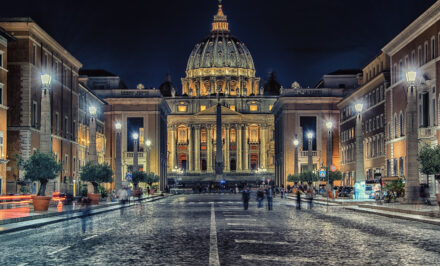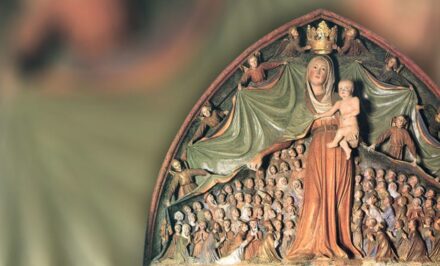 SPAIN, org. In his pastoral plan for the month of May 2014, the Director of the Schoenstatt M1ovement in Spain, Father Carlos Padilla, offers the Schoenstatt Family in Spain and all schoenstatt.org readers, an important and current incentive at the service of life and the Jubilee pilgrimage. His starting point is the Spanish Schoenstatt Family’s Jubilee gift to form a network of living shrines, a network of life, a missionary network. On the road to 2014, he has dedicated this month to pilgrimage and what it means to go on pilgrimage.
SPAIN, org. In his pastoral plan for the month of May 2014, the Director of the Schoenstatt M1ovement in Spain, Father Carlos Padilla, offers the Schoenstatt Family in Spain and all schoenstatt.org readers, an important and current incentive at the service of life and the Jubilee pilgrimage. His starting point is the Spanish Schoenstatt Family’s Jubilee gift to form a network of living shrines, a network of life, a missionary network. On the road to 2014, he has dedicated this month to pilgrimage and what it means to go on pilgrimage.
We are living a year of graces, a year of life in abundance
 We are pilgrims. We have been going on pilgrimage to the Shrine since this year of graces began. Mary awaits us there, educating us, changing our hearts. In fact, we have been on pilgrimage since we received the faith, since the Lord showed us the meaning of our life. God made us pilgrims. The pilgrim begins his road knowing where his steps lead. He knows the goal. He dreams about it. The Emmaus pilgrims were returning home. But their dreams were broken. However, the Emmaus pilgrims became real pilgrims when they left their land and returned to Jerusalem. Before, they were only walking hopelessly. Walking isn’t the same as going on pilgrimage. The walker does not have a clear goal and merely walks aimlessly. Going on pilgrimage is walking toward eternity. The pilgrim has to leave many things behind and has many dreams. The pilgrim abandons security, his homeland, and starts out on a long road. Pilgrimage means leaving behind fears, the weight of life, everything that binds us. The pilgrim needs to put aside plans, possessions, sorrows, and to completely trust in the power of the God of life. Leave so called “comfort zones” where we wanted to reside forever. Yes, the pilgrim leaves everything and sets out on the road. He dreams, waits, desires, yearns, seeks. The desire drives his steps. He has something to give; he has much to receive. For this reason, he waits for what he still does not possess. The pilgrim is clear about where he is going and knows that his life begins with that first step. It does not matter how long the road is. What matters is to have the strength to take the first step. And often, this first step is the most difficult.
We are pilgrims. We have been going on pilgrimage to the Shrine since this year of graces began. Mary awaits us there, educating us, changing our hearts. In fact, we have been on pilgrimage since we received the faith, since the Lord showed us the meaning of our life. God made us pilgrims. The pilgrim begins his road knowing where his steps lead. He knows the goal. He dreams about it. The Emmaus pilgrims were returning home. But their dreams were broken. However, the Emmaus pilgrims became real pilgrims when they left their land and returned to Jerusalem. Before, they were only walking hopelessly. Walking isn’t the same as going on pilgrimage. The walker does not have a clear goal and merely walks aimlessly. Going on pilgrimage is walking toward eternity. The pilgrim has to leave many things behind and has many dreams. The pilgrim abandons security, his homeland, and starts out on a long road. Pilgrimage means leaving behind fears, the weight of life, everything that binds us. The pilgrim needs to put aside plans, possessions, sorrows, and to completely trust in the power of the God of life. Leave so called “comfort zones” where we wanted to reside forever. Yes, the pilgrim leaves everything and sets out on the road. He dreams, waits, desires, yearns, seeks. The desire drives his steps. He has something to give; he has much to receive. For this reason, he waits for what he still does not possess. The pilgrim is clear about where he is going and knows that his life begins with that first step. It does not matter how long the road is. What matters is to have the strength to take the first step. And often, this first step is the most difficult.
We are pilgrims. The Church is pilgrim. Schoenstatt is an apostolic movement of pilgrims
Spain is a land of holy pilgrims. Walking is part of our life. We do not want to become accustomed to a static comfort. To go on pilgrimage allows us to be attentive, willing to seek where and how to follow the road. The pilgrim lives in the moment, puts down roots with each step, abso1rbs the beauty of the road with the eyes of a child. Every stop, every town, every moment, every man, is important because it all comes from God. Everything belongs to Him, and for this reason it belongs to the pilgrim. Everything matters to him; nothing makes him indifferent. That is why he is able to leave his own, those he loves. But at the same time, he does not leave them because he carries them in his heart, carries them in his soul. The pilgrim knows that everyday he will have unexpected moments, many surprises. He knows where he is walking, but he is not overwhelmed by thoughts about what will come, about everything he lacks. That is not important. What counts is the stage of the day, the rise of the road, the home where you will spend the night. The pilgrim experiences the road fully; he knows that it is the necessary step towards the goal. The road is long and this is why the pilgrim travels lightly. He knows the road is hard. He leaves what he does not need, and walks knowing what he will not miss. Sometimes in life we carry too many things. We are anxious about what lies before us. We suffer. The heart becomes attached. It does not want to lose anything that belongs to it. We keep, retain, possess, we obsess for fear of loss.
The pilgrim always looks to heaven and therefore is not overwhelmed by everything he cannot control
 God walks in his soul. Mary is his constant companion. He is not afraid. He trusts. The pilgrim is barefoot, because he is not attached to norms or security, because he does not aim to impose his norms, decisions or lifestyles on anyone. Forms are important, but they can tie us down and can kill the spirit. Father Kentenich reminded us of the essential: “The spirit creates its own form. The form protects the spirit, but, with time, it also carries the danger of consuming the spirit.”[1] Formalism can make us stagnant and weaken us; it can make us rigid and make us lose compassion. Walking barefoot has its risks. We can suffer on the road. We feel insecure and vulnerable. But it gives us great freedom and it makes us respectful. A barefoot pilgrim does not impose anything, he only accompanies, displays the wide horizon, gives joy, shares dreams. The pilgrim is never alone; he goes with other pilgrims, constructing a family. He always seeks the areas that unite them, setting differences aside. He looks to welcome the newcomer. He supports the weak and accompanies the needy. The pilgrim knows the goal but is not in a hurry. When he does arrive, he trusts it is the right time. He is a pilgrim from heaven, and he makes his trip through earth, a piece of heaven. The pilgrim lives in the heights, taking root on earth. He loves, takes root and flies. God creates his steps. He is a climber of heights. This is why during this year of graces we want to make our life a continuous pilgrimage. We do this by going on pilgrimage to the Shrine everyday. And this month, we will go from one shrine or another in Madrid. It is a small sign. We want to ask Mary to make us live everyday as pilgrims. To trust like pilgrims. Like pilgrims from heaven.
God walks in his soul. Mary is his constant companion. He is not afraid. He trusts. The pilgrim is barefoot, because he is not attached to norms or security, because he does not aim to impose his norms, decisions or lifestyles on anyone. Forms are important, but they can tie us down and can kill the spirit. Father Kentenich reminded us of the essential: “The spirit creates its own form. The form protects the spirit, but, with time, it also carries the danger of consuming the spirit.”[1] Formalism can make us stagnant and weaken us; it can make us rigid and make us lose compassion. Walking barefoot has its risks. We can suffer on the road. We feel insecure and vulnerable. But it gives us great freedom and it makes us respectful. A barefoot pilgrim does not impose anything, he only accompanies, displays the wide horizon, gives joy, shares dreams. The pilgrim is never alone; he goes with other pilgrims, constructing a family. He always seeks the areas that unite them, setting differences aside. He looks to welcome the newcomer. He supports the weak and accompanies the needy. The pilgrim knows the goal but is not in a hurry. When he does arrive, he trusts it is the right time. He is a pilgrim from heaven, and he makes his trip through earth, a piece of heaven. The pilgrim lives in the heights, taking root on earth. He loves, takes root and flies. God creates his steps. He is a climber of heights. This is why during this year of graces we want to make our life a continuous pilgrimage. We do this by going on pilgrimage to the Shrine everyday. And this month, we will go from one shrine or another in Madrid. It is a small sign. We want to ask Mary to make us live everyday as pilgrims. To trust like pilgrims. Like pilgrims from heaven.
[1] J. Kentenich, The secret of Schoenstatt’s vitality I, 1952
Original: Spanish – Celina M. Garza San Antonio, TX USA













